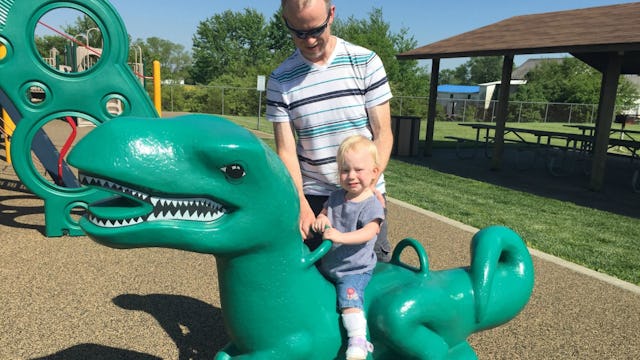My Toddler Can't Walk Yet, And It Almost Takes Me Down

As I held her tiny hands, Evelyn carefully wobbled around the playground; she showed more confidence than she ever had before. Still struggling with balance, muscle strength, endurance, and coordination, her ability to walk independently remains elusive.
It hangs over our heads — my husband’s and mine — every day. Nearing 2 1/2 years old, she deserves to walk to her toys, run with the other toddlers to the swings, and climb the rock wall without one parent pushing her up and the other pulling her at the top.
As we navigate through the low-hung bars and tight corners of the playground equipment, my husband and I squeeze ourselves through each metal obstacle so she can maneuver the giant plaything and reach the parts that interest her. I envy the parents who sit on the sidelines, watching their children play with one eye glued to their cellphone. The freedom that comes with a child who has complete mobility is so enticing, yet always lurking just beyond the grasp of our fingertips.
To us, the burden is huge. To Evelyn, she’s playing and having fun. She does not yet understand her delays. The gleeful smile on her face tells us not to worry so much.
Born prematurely, Evelyn naturally had low muscle tone. Her body was underdeveloped, not yet ready to be in the world. She persevered, learning to feed from a bottle, breathe on her own, and her strength and endurance increased.
But she has other physical health challenges that threaten to steal her independence. Like a 10-pound blanket holding her down, she fights daily against her joint contractures. Diagnosed with arthrogryposis multiplex congenita, most of her joints at birth were stiff and unmoving. To release them from the unnatural stronghold, her limbs require a lot of manipulation, therapy, and exercise.
Laura Gaddis
From the first day in the NICU, we were told she would be okay. She would survive. Her wrists, elbows, knees, and hips would unfold. Even with her feet stuck up by her head, her knees locked in stick-straight positions, and one arm that refused to move, we took it upon ourselves to see that this prognosis would come true.
Under the guidance of physical therapists, we stretched her tiny hands backward, to the side, and in any direction needed to unbend her stubbornly tilted wrists. The most well-intentioned nurses just could not find time to see that Evelyn did her stretches, so with each diaper change, my husband and I did them. Every night as we worried that her muscles would seize back up, we pried ourselves from her bedside to heed our exhaustion and drooping eyelids.
Over time, her therapies changed course to accommodate her improvement. Working around her full-leg casting to correct her clubfoot, we focused on her arms while the legs sat dormant under the brightly colored fiberglass shackles. We were unable to bounce her on her feet, stand her up at the edge of a table, or put her in a jumper, and so we worried about her ability to use her legs. Plowing through eight weeks of casting and 23-hour use of immobilizing brace shoes, we worked her little body every morning when we woke up, every evening after dinner, and right up to the moment she laid her sleepy head down in the crib.
When her squishy baby legs were finally brace-free during the daytime hours, we jumped on the opportunity to get her upright. My heart dropped when I saw how weak her legs were. Never having the chance to build up her chubby thighs, we were tasked with the job of making her do what is instinctual for most babies: We had to show her that her legs were useful too.
Now, sitting in the trenches each night, our hunched backs tense as we shuffle along by her side. Her progress is often undetectable, hiding behind the unrelenting and physically challenging work. As she nears 25 pounds, we need our own physical health to be topnotch to ensure we can withstand carrying, catching, and working with all the physical therapy apparatuses that litter our living room.
Others who see her compliment her advancement. With grins spread wide across their faces, they are surprised by her ability to take more steps, bear weight, and cruise along furniture like a puppy wired on a pot of joe.
But for us, the grueling physical therapy regimen and the unending appointments are taxing. We mindfully stomp down the profound worry about her ability to keep up with her friends and put on the smiles that she needs to see. We make her world fun even when we are exhausted, distressed, and apprehensive. Our persistence takes a toll; our bodies are sore and tired, our minds are anxious and racing for new ideas, and our hearts are often heavy with sadness.
Keeping this inside overloads our souls, but we would never allow her to wallow in the heavy encumbrance. Only we can nurture her peacefulness. We ensure Evelyn experiences the blissful childhood a loving, sweet, funny child deserves.
We are doubtful when progress is so slow it seeps like ketchup stuck in the bottom of the bottle. Every so often we step outside of ourselves, pull our heads out of the mess, and see her breakthroughs. After just enough hits on the side of the glass cylinder, the ketchup is bound to release.
On that playground, she surrendered the usual tight clasp of our hands, teetering far left then right, but often regained her balance. She asked to be put down on her feet when we tried to let her rest in our arms. As she saw the other kids running from monkey bars to the slide, she decided she would do that too, just in her own sweet way. Her fortitude was inspiring.
And she did it all with a smile.